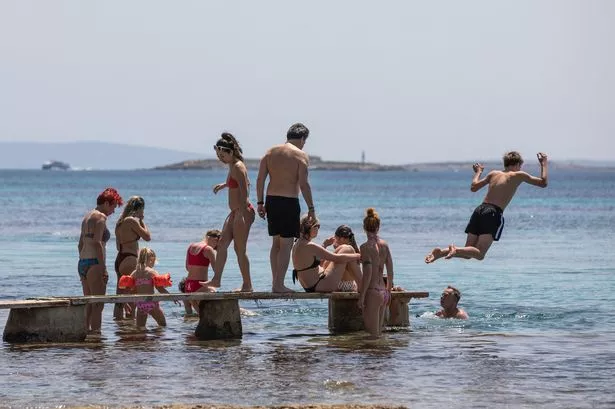British tourists on the two holiday islands of Ibiza and Mallorca have been issued the alert for breaks between now and the end of October, with lifeguards who look after some of the most popular beaches in the Balearics going on strike
Holidaymakers in Mallorca and Ibiza have been warned that “beaches are unsafe” as lifeguards go on strike.
British tourists on the two holiday islands have been issued the alert for breaks between now and the end of October. The warning comes from lifeguards who look after some of the most popular beaches in the Balearics.
They have called a strike over pay and conditions, saying salaries are so low that some of them have to sleep on the beach as they cannot afford to rent. And they have accused local councils of putting lives at risk by failing to come to an agreement which would have avoided walk-outs.
“Safety on the beaches is not guaranteed,” a spokesperson for the lifeguards warned. A last-ditch attempt was made today to reach an agreement, but without success.
READ MORE: Dog owners face pet tourist tax in holiday hotspot after DNA poo database failsREAD MORE: ‘I perfected packing when I went to space – this is how I never forget anything’
The lifeguards from the Balearic Islands have therefore called for a strike on Sunday, September 25.
They are telling the public that the “security on the beaches is not guaranteed”, despite the imposition of minimum services of 100% of the workforce, which the group considers “a violation of the workers’ right to strike.”
The strike will affect all the beaches of the municipalities of Palm and Calvià on Mallorca, as well as the sandy beaches of Ibiza, Sant Antoni de Portmany, Sant Joan de Labritja, SantJosep de sa Talaia and Santa Eulària des Riu. It will start at 8.30am on the beach of Can Pere Antoni, in Palma, with an assembly of workers.
The strike will then be repeated with Sunday strikes until the end of the season, which ends on October 31, in the sandbanks of Palma.
Cristian Ezequiel Melogno, spokesperson for the Balearic Islands Rescue Union, said the strike is over staffing, infrastructure and also wages.
“The lifeguard service is the first to intervene in an emergency on the beaches but the staffing is minimal,” he said. “The concessionaire companies receive the municipal award because they present the cheapest offer.”
“A lifeguard receives a monthly salary of 1,410 euros gross, insufficient to live in the Balearic Islands in a dignified way, with a contract marked by temporality, because we do not work every month,” say the lifeguarsa. “The situation is so undignified that in Ibiza there are colleagues who are forced to live on the beach because they cannot access housing.”
Although the strike occurs at the end of the summer, the beaches continue to receive visitors and the lack of surveillance could put the safety of bathers at risk, the lifeguards have warned.
The lifeguards are demanding improvements in their working conditions, job stability, strict compliance with regulations and greater public investment in beach safety. They point out that reducing surveillance on beaches is comparable to closing a hospital, as the safety of citizens must be a priority.
This summer, concerns were heightened after four drownings on Palma’s beaches in just 45 days. The deaths, all in bathing areas without active lifeguard coverage at the time, triggered renewed debate over beach safety during peak tourist season.
The incidents occurred between late June and August at Playa de Palma, Ciudad Jardín and El Molinar. The victims, aged between 65 and 84, suffered collapses or drownings at times when no lifeguards were on duty, before shifts began, after they ended, or in areas without surveillance. In all four cases, the emergency response came too late and resuscitation attempts failed.
Lifeguard professionals warn that regional regulations in place since 2015 are being poorly enforced. The Balearics are estimated to be short of more than 300 lifeguards, while current shift patterns fail to cover peak bathing hours. In many coastal areas, there is no standby staff outside standard service times, leaving long stretches of beach effectively unprotected.
